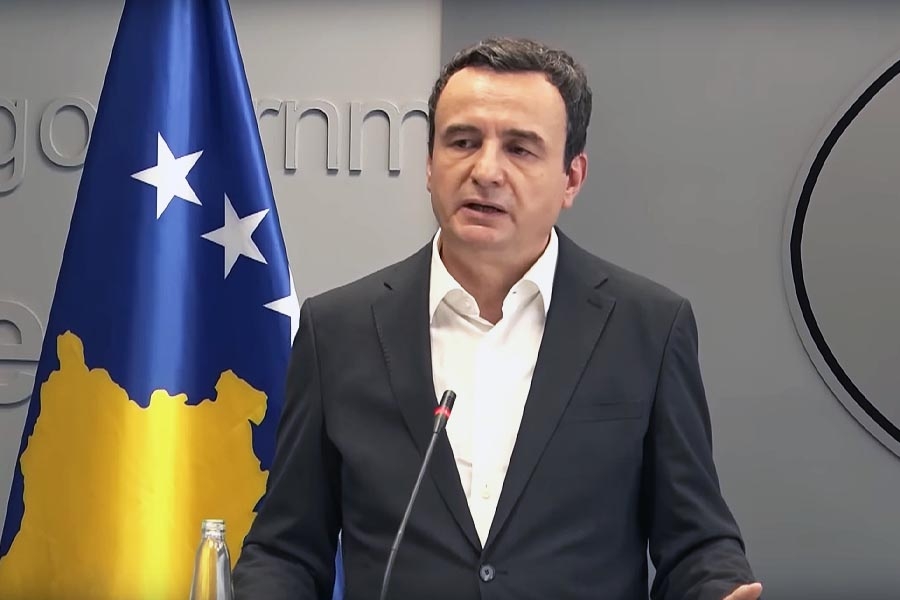After the decision of the Government of Serbia on license plates for vehicles from Kosovo, which continued the implementation of the Brussels Agreement and the Ohrid Annex, Pristina is next. The main obligation of Pristina, without a doubt, relates to the formation of the community of Serb municipalities. The EU stressed again these days that the draft statute of the ZSO presented by its representatives is October 21st as “best possible”
GLOSA2: On the other hand, there are obligations under the Ohrid Annex that Belgrade and Pristina have yet to meet. Among such points are mutual recognition of documents and symbols (passports, diplomas, customs stamps), as well as the clause that “Serbia will not prevent Kosovos membership in any international organization”

After the decision of the Government of Serbia on license plates for vehicles from Kosovo, which continued the implementation of the Brussels Agreement and the Ohrid Annex, Pristina is next. The main obligation of Pristina, without a doubt, relates to the formation of the community of Serb municipalities. The EU stressed again these days that the draft statute of the ZSO presented by its representatives is October 21st as “best possible”
GLOSA2: On the other hand, there are obligations under the Ohrid Annex that Belgrade and Pristina have yet to meet. Among such points are mutual recognition of documents and symbols (passports, diplomas, customs stamps), as well as the clause that “Serbia will not prevent Kosovos membership in any international organization”

The governments decision to enable the unhindered movement of vehicles with Kosovo plates on the territory of our country since January 1st is a continuation of the implementation of the Brussels Agreement and the Ohrid Annex. After this move by Belgrade, it is the turn of Albin Kurti and Pristina, which have long delayed the formation of the community of Serb municipalities.
The question of the licence plates has long been the issue of discord between Belgrade and Pristina. The situation was further aggravated after the Kosovo authorities in September 202 stop issuing license plates of KS, and treat as legal those with the designation RKS. July 2022. It was precisely because of the issue of license plates that the Serbs set up barricades, and in November of the same year they left the institutions of Pristina in the North, after the director of police for the northern region, Nenad Djuric, was suspended. Djuric did not want to implement the decision of Pristina authorities on the re-registration of cars with Serbian plates in “RKS”.
In the framework of the Brussels dialogue, November 2022 an agreement was reached on license plates approved by the Serbian authorities for cities in Kosovo, and the Kosovo governments plan from October last year envisaged that since April 21st 2023 only cars with “RKS” license plates will be allowed.
In the meantime, there was an escalation of tensions, culminating in the end of September 2023 there was an armed incident in Banjska. This greatly weakened Serbias position in the negotiation process in Brussels. However, with the latest decision on tables, Belgrade proves that the continuation of the implementation of the agreement has been achieved.
Belgrades latest decision was publicly welcomed by the European Union. EU Spokesman Peter Stano said that this paves the way for the complete abolition of the sticker regime and that the Union now expects Kosovo to respond in a similar way.
Pristinas main obligation, without a doubt, relates to the formation of the Community of Serb Municipalities. The EU stressed again these days that the draft statute of the ZSO presented by its representatives on October 21st is the “best possible”. In this way, Brussels responded to Albin Kurti, who recently said that he could write a “modern European draft statute”.
In response to the Pristina newspaper Koha ditore, the EU also noted:”Kosovo has had the opportunity to submit a proposal for the ZSO for the last 10 years".
As is well known, the formation of the ZSO was agreed by the First Brussels Agreement, which was signed in April 2013, with the mediation of Catherine Ashton, then head of EU diplomacy, by the then prime ministers in Belgrade and Pristina, Ivica Dacic and Hashim Thaci. In accordance with the competences conferred by the European Charter of local self-government and Kosovo law, participating municipalities shall have the right to cooperate in the collective implementation of their powers through the Community/Association. The association / community will have full control over the areas of economic development, education, health, urbanism and Rural Development. The Association / Community shall exercise other additional powers delegated to it by the central authorities. The Community/Association shall have a representative role towards the central authorities and to this end shall be represented in the Consultative Council of the community. In order to fulfil this role, a monitoring function is provided”.
Over the past ten years, Belgrade and Pristina have adopted a number of agreements within the EU-sponsored Brussels dialogue, including those on telecommunications and energy. Already in June 2013 the two sides exchanged liaison officers. The telecommunications agreement allowed Kosovo to receive the area code (+383). In the late June 2022 Belgrade and Pristina accepted the “roadmap for the implementation of energy agreements within the Brussels dialogue”. In the early December 2023 the EU Special Envoy for the dialogue between Belgrade and Pristina, Miroslav Lajcak, announced that the Serbian company “Elektrosever” signed a commercial energy contract with the Electricity Distribution Company in Kosovo (KEDS). According to Lajcak:”this is an important step towards the implementation of the energy roadmap and towards the normalization of relations between Kosovo and Serbia".
On the other hand, there are obligations under the Ohrid Annex that Belgrade and Pristina have yet to meet. Among such points are mutual recognition of documents and symbols (passports, diplomas, customs stamps), as well as the clause that “Serbia will not prevent Kosovos membership in any international organisation”.
The provision of the Annex, which is particularly important for the survival of the Serb community in Kosovo, is Article Seven. "The rights of the Serb minority in Kosovo should be protected in accordance with European practice, the right to an appropriate level of self-management for the Serb community, opportunities for direct support and ties of Kosovo Serbs with the Government of Serbia, as well as the protection of the Serbian Orthodox Church.
In all societies there are issues that are rather being skipped. Certain...
The neoliberal path, started in 2001, has led to especially bad results in Serbi...
For centuries, the region was subsumed within the Ottoman and Hungarian Empires,...
"Serbia has returned to the systemic and anti-systemic position of the political...
In reality, Serbia is closer than ever to NATO. In the course of the last five y...